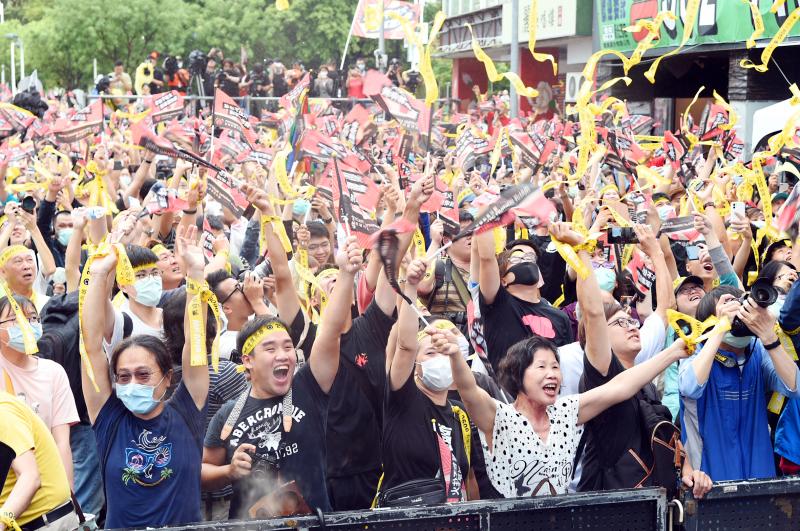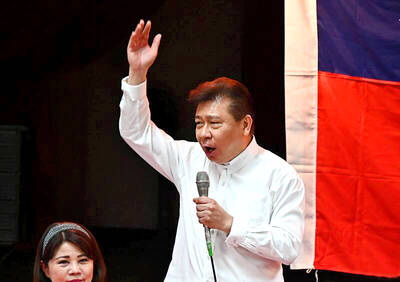A few days before Han Kuo-yu’s (韓國瑜) recall vote, a supporter of the Kaohsiung mayor called her fifty-something daughter Sasha and told her not to cast a ballot. A devout Buddhist, the mother even warned that Sasha would receive “retribution” (報應) if she voted in favor of the recall.
Sasha, who didn’t want her real name used, used to be a supporter of the Chinese Nationalist Party (KMT). However, when Han emerged as the party’s mayoral candidate in 2018, she pulled her support because she “detests” him. WeCare Kaohsiung, a coalition of civic groups, wanted Han recalled because six months after becoming mayor, he threw his hat in to the ring to become president. He lost that race in January.
During the call last week, Sasha proposed an agreement with her elderly mother. She would skip the vote if her mother did not go to polling stations to observe who did vote. Despite the agreement, on Saturday, while her pro-KMT mother stayed home, a strategy promoted by Han to keep voting numbers down, Sasha covertly went out and voted to oust the mayor.

Photo: Zhang Chih-yi
The mother-daughter generational divide and secrecy is representative of many families in Kaohsiung. The nature of the recall — where supporters went out to vote and opposers stayed at home — only brought generational and political tensions into sharper focus.
Linda Lin, 25, who didn’t want to give her full Chinese name, recounted a similar story of clandestine behavior.
Lin is from a historically pro-KMT family in Kaohsiung’s Hunei District (湖內). She says that even though she has never expressed strong affiliation to either major party, her family still persuades her to vote KMT at every election.
.jpg)
Photo: James Chater
In the run up to the recall vote, however, concerned she would vote in support of the recall, her family’s persuasion became blatant obstruction.
Currently preparing for exams, it wasn’t until a few days before the recall that Lin realized the voting slips had not yet arrived at their house. With only days till the poll, she immediately thought this was “weird.”
Later, as she was getting ready to leave home, she saw something peculiar behind the shoe cabinet. Stuffed behind it, almost completely out of sight, were the voting slips she thought had not yet arrived. She knew immediately her mother had hid them there in the hope she would not vote.
.jpg)
Photo: James Chater
Lin was not angry, and actually found the episode amusing. Still, skeptical of raising the issue, she didn’t confront her mother. Instead, she noted down her voter number so she could vote, returned the slips to the shoe cabinet and “went along with the fiction.”
In an interview on the afternoon of polling day, Kaohsiung Information Bureau Director-General Steve Cheng (鄭照新), and a senior member of Han’s team, expressed concern that the recall vote had the potential to entrench divisions across Kaohsiung.
It is for this reason, he said, that the Han campaign had not encouraged people to vote, for fear that this “irresponsible approach” would stoke friction within families across the city.
“We would rather lose,” Cheng said, “than let the city become full of conflict.”
However, to a certain extent, this friction was unavoidable. Even if, on Saturday, it was circumvented through surreptitious trips to polling stations, in the weeks before the recall, discussions in Kaohsiung’s households inevitably found their way to Han’s fate as mayor.
For Chiu Hsueh-mei’s (邱雪梅) family, the recall was a source of considerable acrimony. In a phone interview, she said that the position of city mayor should not be a DPP-KMT question, but that older blue-leaning members of her family “just won’t have this consideration.”
She added that these older family members, a number of whom were retired civil servants, just simply would not accept any of the arguments against Han. In the weeks before the recall, when controversial topics arose, she said, “we just wouldn’t continue discussing it.”
None of Chiu’s older family members voted on Saturday.
Lev Nachman, a Fulbright Scholar who specializes in Taiwan’s party politics, said that despite the categorical result, the reality of these underlying divisions should not be underestimated. Han’s loss in the January presidential election was one thing, “but the recall to blue voters seems to hurt extra.”
A by-election for Han’s position must now be held within three months. It is only after this by-election, Nachman says, that the Kaohsiung city government will truly be able to alleviate tensions. Until then, the risk of entrenching divisions remains.
But perhaps more importantly, as Kaohsiung approaches that by-election, secrecy and glossing over of reality catalyzed by the recall may become ever harder to maintain.

March 10 to March 16 Although it failed to become popular, March of the Black Cats (烏貓進行曲) was the first Taiwanese record to have “pop song” printed on the label. Released in March 1929 under Eagle Records, a subsidiary of the Japanese-owned Columbia Records, the Hoklo (commonly known as Taiwanese) lyrics followed the traditional seven characters per verse of Taiwanese opera, but the instrumentation was Western, performed by Eagle’s in-house orchestra. The singer was entertainer Chiu-chan (秋蟾). In fact, a cover of a Xiamen folk song by Chiu-chan released around the same time, Plum Widow Missing Her Husband (雪梅思君), enjoyed more

Last week Elbridge Colby, US President Donald Trump’s nominee for under secretary of defense for policy, a key advisory position, said in his Senate confirmation hearing that Taiwan defense spending should be 10 percent of GDP “at least something in that ballpark, really focused on their defense.” He added: “So we need to properly incentivize them.” Much commentary focused on the 10 percent figure, and rightly so. Colby is not wrong in one respect — Taiwan does need to spend more. But the steady escalation in the proportion of GDP from 3 percent to 5 percent to 10 percent that advocates

From insomniacs to party-goers, doting couples, tired paramedics and Johannesburg’s golden youth, The Pantry, a petrol station doubling as a gourmet deli, has become unmissable on the nightlife scene of South Africa’s biggest city. Open 24 hours a day, the establishment which opened three years ago is a haven for revelers looking for a midnight snack to sober up after the bars and nightclubs close at 2am or 5am. “Believe me, we see it all here,” sighs a cashier. Before the curtains open on Johannesburg’s infamous party scene, the evening gets off to a gentle start. On a Friday at around 6pm,

A series of dramatic news items dropped last month that shed light on Chinese Communist Party (CCP) attitudes towards three candidates for last year’s presidential election: Taiwan People’s Party (TPP) founder Ko Wen-je (柯文哲), Terry Gou (郭台銘), founder of Hon Hai Precision Industry Co (鴻海精密), also known as Foxconn Technology Group (富士康科技集團), and New Taipei City Mayor Hou You-yi (侯友宜) of the Chinese Nationalist Party (KMT). It also revealed deep blue support for Ko and Gou from inside the KMT, how they interacted with the CCP and alleged election interference involving NT$100 million (US$3.05 million) or more raised by the